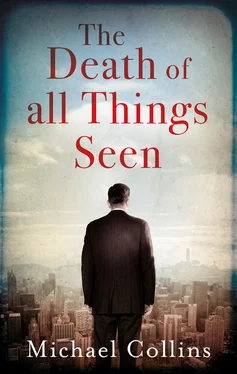Michael Collins
The Death of All Things Seen
About The Death Of All Things Seen
It’s 2008 and Norman Price — a moderately successful forty-something playwright living in Chicago — considers the shuddering impact of the financial crash. What’s needed, he thinks, is the will for a new existence. When his parents die, one shortly after the other, The New Existence becomes Norman’s mantra as he tries to recalibrate his own shaken world.
Into Norman’s tentative re-building, a couple of bombshells are dropped. His parents’ old house has to go on the market, forcing him to revisit the past. And then he receives a mysterious email from a man he has never met but whose name is instantly, painfully, familiar.
Norman’s new existence is suddenly threatened by past secrets.
Michael Collins takes post 9/11 America as the background for a deeply moving novel about complex identities and the fragility of humanity.
The Death of All Things Seen
To my wife and children
Thanks to Maggie McKernan, David Godwin, Dominique Bourgois and Kim McArthur for faith and guidance.
To Amal Chatterjee, Joe Lemrow, Will Tomory and Karl Ameriks as early readers. To Heidi and Nora for editorial insights, advice and countless hours of reading.
And to my parents for the early years of sacrifice and love and showing me how to live life and take chances.
The world breaks everyone,
and afterward, some are strong
at the broken places.
— ERNEST HEMINGWAY
IT HAD BEEN over a decade since Helen Price had driven along the Gold Coast in the push of an early afternoon commute. This time, however, she was driving against the flow of traffic, heading to the city and not out toward the suburbs. The direction sat as a point of significance, figuring in the literal transformation of her life these past few years, the run against the grain of any true forward momentum, a life pushing backward in time toward old memories, to islands of remembrance of who she was and who she had once been.
How had it come to pass, this vast sweeping change, this passage of time, so she found herself at a point where life appeared, neither here nor there, but belonged to the past? Maybe this was the melancholy essence of growing old, of being old.
*
There was only an hour to go before her doctor’s appointment. Yet, Helen couldn’t help weigh the significance of a receptionist’s polite insistence that she switch her appointment from Monday to Friday, and to Dr Marchant’s downtown office where allegedly a last minute cancelation had opened up in the late afternoon, the concatenation of facts hemming her into a reality that there could be no further happiness, no further life .
She considered staying on Lake Shore Drive, then, deciding against it, she changed lanes, exiting into merging traffic along Michigan Avenue. She felt an almost immediate sense of déjà vu in having taken this route so many times before.
It was not, however, quite as it had been. Nothing was anymore. If she could alter the perspective ever so slightly, if she could beg such small mercies on this day of remembrance, reclaim the past for a moment, she would swap her compact Toyota Corolla for one of those bygone fin-tail floating Detroit fortresses.
What she had in mind was the 1963 Buick 4600 Invicta with the tomato red leather interior she and her husband Walter had purchased the first year of their marriage — the Invicta, the first and last car she ever drove straight off a showroom floor.
She’d adjust, too, the garish fluorescence of the Michigan Avenue storefronts, temper them with the Technicolor warmth of Breakfast at Tiffany’s , filtering everything through a Hollywood cheesecloth that had defined an America of pillbox hats and high heels. How one appeared to the world mattered once.
And, if she could effect those changes on this melancholy day, she would go back further through the blur of history, undo so many events, finding a point of re-entry into life when she had the thread of continuity. She would begin by re-aligning historical details, remote and yet personal to her, events as she now remembered them — reinstate the Shah of Iran, unhood and march the hostages back to American shores, send Khomeini back into exile. Reinstall Nixon, unplug the Watergate devices, silence Deep Throat, undo Nixon’s visit to Red China. Fill the empty gas pumps of the 1973 Oil Embargo, keep the bigness of US cars and the monopoly of Bethlehem Steel, resanctify the unions, resurrect Jimmy Hoffa. She would also lead a retreat out of Vietnam, dislodge the bullets from the brains of MLK, Bobby and John F. Kennedy. She’d repeal, too, the benevolence of the Marshall Plan, spinning back time to some twilight pre-adolescence of first cognition, stop time somewhere after the dropping of the bombs on Hiroshima and Nagasaki, begin it again in the Cold War brinksmanship with the defined enemy of the Communist Soviet Union.
She was aware she had not included undoing the recent horrors of 9/11, not started at that new point of national hysteria. It was not her history, not really. She felt the emotional slippage. The inconsequential piling of new histories that no longer impinged on her immediate life with any sense of real urgency, just as untold tens of millions before must have surely arrived at certain points in their own lives where events, even as monumental as Pearl Harbor, just floated, unmoored of any real significance — psychological life lived, not in a forward trajectory, but built up around points of personal perspective — each generation, no, each individual at the end, an island unto itself.
Helen Price was conscious of how upset her son Norman would be with her in expressing this melancholy sense of loss. Undoubtedly, he would have stridently argued against her present vision of history, pointing out her incongruous lament for a succession of generations who had slaughtered themselves across a half-century of two world wars, plunged themselves into the shadow of nuclear annihilation, not to mention the protracted economic miasma of the preceding age of Robber Barons, The Stock Market Crash, and The Great Depression.
She could almost hear Norman’s voice in her head, his rarified, injurious assessment of other people’s lives that had already coalesced in his indignant, hurtful one-man shows, from Confessions of a Latchkey Kid , to his follow-up, Angry Man , a scathing indictment of Walter that had become a minor Chicago theatrical phenomenon.
How would Norman now title her life — Sad Woman, Dying Woman, Lonely Woman ? She tried to imagine the exchange, her story unfolding as a natural corollary to Walter’s life, a companion piece to Angry Man , another black box theater production, her offstage voice playing against Norman’s voice, carried over the stilled dark. This, the perceivable endgame, a pitiless assessment of two people who had gone broke educating what turned out to be a recalcitrant gay man who had decided to damn the history of civilization for perceived homophobic injustices.
She felt her heart race even as she reached for the word homophobic . The estrangement was Norman’s doing, and yet, in coming again to her own life, she would have to cede to some of his points, to a revisionist history now taught in schools that gave him his confidence, his optimism, his distaste and distrust of the past.
And yet it wasn’t exactly how history had unfolded, not really, not how she remembered it. She found herself shaking her head ever so slowly, seeing further back before Norman, memories of her early courtship, the drive-in ice-cream parlors and drive-in movies; the solidarity of small-town homecomings, the flotilla of convertibles escorting Kings and Queens to the floodlit fields of night game inter-county rivals, everyone seeking simply to reclaim the familiar, to set aside recent horrors, to fall in love with poodle-skirted girls in push-up bras, cashmere sweaters and mother-of-pearl earrings. It played just so in her mind, in spools of old reel turning slowly against the foreground of a more recent, but disconnected, debased present.
Читать дальше












